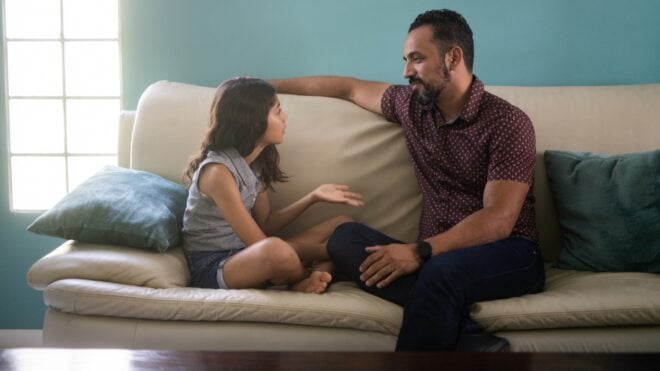It only took three days after my daughter was born for me to realize something was very wrong—not with her, but with me. My little girl, my second child, was absolutely perfect. She had a full head of jet-black hair, lips rosy enough to make her look like she was wearing lipstick and one adorable dimple on the left side of her face.
But when I looked at her, I felt nothing. "That's a cute baby," I thought to myself, as if she weren't mine.
I knew I was lucky to have not just one, but two healthy babies. I knew I was lucky to get a girl after having a boy. I was always scared to gender-wish in relation to my kids, but deep down inside, I felt lucky and thrilled to have an older son and now a baby girl.
RELATED: I Admit It: I Was Disappointed About Baby's Sex
My mind started to go into a terrible spin cycle that had me reeling, wondering how I'd screwed up our family of three by adding sleepless nights, breastfeeding, tantrums and teething into the mix. My older son was 3 at the time and my husband and I had just gotten into a parenting rhythm. Life finally felt easier. And here I was holding a newborn that was going to wreck our rhythm and have me exhausted and drained all over again.
So while everyone around me gushed over my daughter and told me how lucky I was to have a baby girl, I spent my time Googling, "How to return a baby." My mind was filled with images of me shoving her back up between my legs. I couldn't eat and felt like I was floating in a cloud filled with anxiety and regret. I never wanted to hurt my baby nor myself, but I desperately wanted to return her. I wanted to send her back.
PPD flattened me and left me no choice but to address how my desire to be a perfect mom left me depleted, depressed and anxious.
The guilt I felt was overwhelming. I was never a person who had things come to me easily in life, but pregnancy and babies did come easily. And here I was, wishing it all away. I felt constrained and I dreaded my husband's long work hours that had me as the ad hoc, default parent who needed to know everything and be ready for anything at any time. I flogged myself for not thinking of all of this earlier, as if having a baby was somehow a mistake I should have foreseen.
Thankfully, it didn't take me long to realize I had a serious case of postpartum depression. I didn't have the blues. I had the worries. And I knew I needed to do something about it, quick. So my husband and I got as much help with the kids as we could afford, and my mom graciously filled in the gap. I needed extra hands so I could worry about getting myself better while knowing that my baby was in good hands, even if they weren't mine. And with the help of some amazing therapists who specialized in PPD (I went through three before I found the right one), some helpful medication and a very supportive husband, I learned that my worries were very real. While the hormones that had me in a malaise would eventually go away, the worries behind them wouldn't. I couldn't be the superhero mom I'd tried to be the first time around. But when I finally got better three months later, I realized I didn't have to.
PPD flattened me and left me no choice but to address how my desire to be a perfect mom left me depleted, depressed and anxious. I'd never want anyone to go through what I did, but I look back and realize just how much I learned. Turns out, PPD made me a better mom. Here's what I learned.
There is no 'getting it right' in parenting
Much of my anxiety buildup and worry came from a desire to have my life in order. I wanted things to run smoothly. I wanted to be able to count on something. But when you're raising kids, you can have the best-laid plans and they might all go awry. I learned to stop trying to get parenting right and be more in the moment, to accept that things go wrong.
Moms are allowed to not like every part of parenting
When I had my first child, I felt like an alien mom because I hated going to the park and couldn't stand one more endless stroller push through the mall. Through therapy, I learned that motherhood didn't have to be a series of days I suffered through. My kids would be fine without the park and I didn't need anything at the mall. I started to look at motherhood as something I could define instead of something that had a rulebook. It helped me a lot to feel less constrained and quite frankly, less bored.
Parenting between partners doesn't have to be equal
During my first child's infant stage, I wanted my husband and I to share all the burdens of being up in the night. In turn we were both exhausted and short-tempered all the time. I learned I can function on very little sleep and my husband can't. So I took all the nights with my daughter and my husband picked up other areas in which he did better than me. We started to work as a team rather than competitors on a tit-for-tat reality show. It gave us both room to breathe and not feel like we were on duty every second of the day.
Every parent should have time off for the things that fuel them
After my bout with postpartum, I realized there are a few things I need for myself to help me be there for everyone else.
I like to exercise. My husband likes to sleep. With our first child, we saw time away from the family as slacking off or not being there for each other. After my bout with postpartum, I realized there are a few things I need for myself to help me be there for everyone else. And my husband was able to keep the things he needed, like sleep and downtime, so he could have more energy for us. Now we enjoy our time together and apart and don't begrudge the other for asking for it.
It's OK to ask for help
I'm a private person and probably overly stoic. But when you have two little kids and a terrible case of PPD, you need all the help you can get. I couldn't hide what I was going through from friends. To my surprise, so many of my close friends made themselves available to me and offered to help with my kids. I'll never forget it. And I'll never again judge myself when I need to ask for help.
I learned how to be a better friend
Because so many people offered me help when I was down, I took notes on how to better be there for other people. I remember each and every tiny thing someone did for me and realize those tiny things can change the course of someone's battle with depression. We have no idea of our ability to impact others until we've seen it first hand.
If you need to go on medication, you're not weak
There's nothing heroic about suffering in silence.
I had bouts with depression twice before in my life, but nothing quite this serious. I'd always gutted it out and worked it out myself. I'd never do that again. There's nothing heroic about suffering in silence. When I had PPD, I went on medication and immediately saw the results. It helped me clear the fog and focus on the very real anxieties I had that were fueling my PPD.
I learned my limits
Part of my worries and depression came from a feeling that I had to be this limitless mother who never got tired, always had the answer and enjoyed every minute of parenting. Truth is: I do get tired, I sometimes lose my temper, I can't answer every question, I can't remember to do everything on my to-do list. And my kids still love me. By admitting I had limits and by being willing to express them, I was able to do a better job at what I am good at.
I saw how kind and supportive other mothers can be
When my daughter was born, I got an endless stream of emails and calls from women I was both close with and not extremely close with offering to talk. The resounding sentiment was "It's really hard to go from one child to two"—and then each graciously shared her story. Those calls meant more to me than anyone could have known. They were my lifeline and told me I was not alone.
RELATED: The Words That Got Me Through Postpartum Depression
And lastly, I learned just how very serious depression and anxiety can be
So for everyone battling, or who has battled depression, know that you are not weak and you're not someone who can't get it together. Take it from me, you do and will love and connect with your child. You just have to love yourself a little more first.




